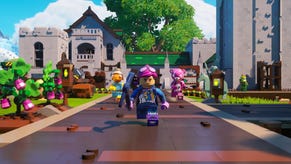Third time's a charm: Victory Lap Games' mission to bring a mobile game to console
CTO and co-founder Mike McManus discusses his studio's convention-defying approach to games-as-a-service
Blast Zone! Tournament is somewhat of an anomaly in 2018. It began life as a Facebook game before launching on mobile only to be shut down and, years later, redeveloped for PC and console.
As if things weren't atypical enough, Blast Zone Tournament - a competitive multiplayer game inspired by the Bomberman series - will have a premium price point and not feature any microtransactions or loot boxes.
By moving away from mobile rather than toward it and offering the game-as-a-service without including tried and tested monetisation methods it defies all conventional practices as a business model.
However, in order to understand where Blast Zone Tournament finds itself now, we need to start at the beginning.
After enjoying a modest amount of success on Facebook as its original incarnation Bomb Buddies, developer Balanced Worlds was acquired by Kabam in 2012. The first order of business was to translate that success onto mobile.
In 2014, Blast Zone arrived on the App Store and within a week had 900,000 players. After six months, however, the game was shutdown and the team moved over to another project.

It wasn't until February last year that Blast Zone was given another chance when ex-Insomniac developers Chris Pfeiffer and Mike McManus founded Victory Lap Games. Pfeiffer and McManus, both of whom had worked on Bomb Buddies and Blast Zone for iOS, elected to buy back the rights to their game and bring it to PC and console.
At a time when developers are frantically trying to port console games to mobile, as seen most recently with Fortnite and PlayerUnknown's Battlegrounds, it seems almost counter-intuitive.
However, speaking with GamesIndustry.biz, McManus says Blast Zone was effectively stifled as a mobile game. The frenetic action is more at home on a larger screen and, as McManus notes, virtual controls on mobile are often lacking.
"Throughout the development of Blast Zone for mobile, we really thought it needed to be on consoles," he says. "We were fighting against that throughout, but now we find ourselves in a position where we can execute it."
Of course, online competitive multiplayer games need more than just the right platform to succeed and this is where Victory Lap begins to diverge with the prevailing consensus regarding monetisation of service-based games.
Blast Zone Tournament will launch at the higher end of the indie pricing scale at $19.99, and won't include any additional monetisation. In an environment where games-as-a-service are becoming the norm, especially for competitive multiplayer titles like Blast Zone, this once again seems counter-intuitive. How exactly does Victory Lap intend to support its game in the long-term without the steady stream of income from the GaaS model?
"We never actually even considered free-to-play because we've already tried it twice... we wouldn't have even started Victory Lap Games in that context"
"Our business model is really easy," explains McManus. "It prices exactly the same as a game like Rocket League, plus we have an completely fleshed out single-player game.
"When you treat these games as a service, and you can guarantee that the revenue of a player is $19.99, then you can focus on getting out to other channels and other platforms so that you're constantly getting new users who are then purchasing the game, then the issue of supporting the game isn't really a problem."
With countless cosmetic items and hundreds of maps, Blast Zone is exactly the sort of game you would expect to feature microtransactions in the current market. However, McManus argues that by piling resources into developing content for sale they would essentially be sideling the continued support and development of the game itself.
"We never actually even considered free-to-play because we've already tried it twice," says McManus. "In our case it's actually really easy to say no. We wouldn't have even started this, because in 2012 Bomb Buddies on Facebook and PC was free-to-play, then again in 2014 the iOS game was free-to-play. We wouldn't have even started Victory Lap Games in that context."
McManus is quick to clarify that Victory Lap isn't opposed to free-to-play models, but that it simply didn't make sense for what the studio was building.
"We were asking ourselves specifically what's the medium that makes the most sense?" he says. "To talk about mobile and console, they are just completely different ecosystems. It wasn't that we wouldn't do free-to-play or wouldn't do mobile, but rather which way made the most sense for us to bring this game to consumers.
"Because we were so crystal clear with that answer from the very beginning there was never a serious discussion about anything else. It really helps that this isn't the first generation of the game so we've had that experience before. Had we not, maybe it would have been a little harder and we might have had to rack our brains a little bit more, but it was really just a very clear path to make it that premium price."
Victory Lap finds itself in a unique position with Blast Zone! Tournament. Not only has the core team already had two passes at the game, but it also has a built-in fan base from the Bomb Buddies Facebook page. With Steam increasingly crowded, and the game's long-term success resting on strong sales rather than a few big spenders, cutting through the noise of an increasingly crowded marketplace is the real challenge for Victory Lap.
"Throughout the development of Blast Zone for mobile, we really thought it needed to be on consoles... We were fighting against that throughout."
Getting a game on the right platforms is only half the battle these days. The means by which consumers discover games has changed vastly with the proliferation of gaming video content, which has an audience of around 665 million, and global esports audience numbers are expected to account for roughly half of that figure.
While esports may not lie at the centre of Victory Lap's strategy, the developer has made sure to put the rights tools in place to enable esports, and McManus says they are "absolutely looking to collaborate with exceptional people" when it comes to building an esports ecosystem around the game.
"The launch of the product isn't even the first chapter of what we hope Blast Zone Tournament to be," says McManus. "We hope it's the foreword to the service. Once the game launches there are so many different directions we could go, be it working with different distribution platforms, be it pushing the esports angle, be it adding more single-player content.
"The thing we want to really focus on now is getting the product out and begin engaging with people who are actually playing our game."



.jpg?width=291&height=164&fit=crop&quality=80&format=jpg&auto=webp)





.jpeg?width=291&height=164&fit=crop&quality=80&format=jpg&auto=webp)